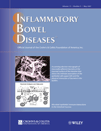CCFA Microbial–Host Interactions Workshop: Highlights and key observations
Abstract
This article provides a summary of the proceedings of the CCFA Microbial–Host Interactions Workshop that was held in St. Petersburg, Florida, on March 16–19, 2006. Approximately 75 senior and junior investigators from around the world shared their most current research findings through oral presentations, poster sessions, and active discussion. Because intestinal microbiota are significant contributors in the development of inflammatory bowel diseases (IBD), understanding the body's responses to and interactions with microbes, especially in the colon and distal small intestine, is critical to elucidating the etiology and pathogenesis of IBD and developing effective therapeutic interventions. Major advances have occurred recently in molecular detection of luminal bacterial species, identifying dominant microbial antigens that drive intestinal inflammation, the mechanisms of innate immune and epithelial responses to bacteria, and regulation of inflammation by innate and acquired immune cells.
(Inflamm Bowel Dis 2007)




